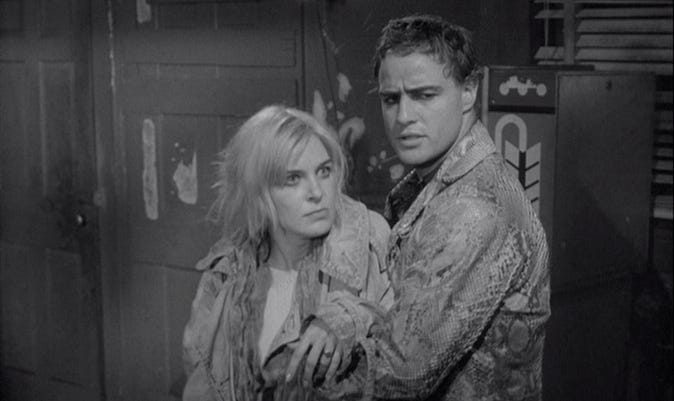A flawed collaboration between Marlon Brando, Sidney Lumet, and Tennesee Williams

Every so often you can be taken aback at the talent involved in a film, such is the case with The Fugitive Kind. No hyperbole, with a cast featuring Academy Award winners Marlon Brando (On the Waterfront), Anna Magnani (The Rose Tattoo), Joanne Woodward (The Three Faces of Eve), and Maureen Stapleton (Reds). In the director’s chair sat Sidney Lumet (Dog Day Afternoon, Network), working from a script by esteemed playwright writer Tennessee Williams (A Streetcar Named Desire, Cat on a Hot Tin Roof), who adapted the tale from his 1957 play Orpheus Descending along with Meade Roberts (The Stripper, In the Cool of Day). While the ingredients speak to something special, The Fugitive Kind is more interesting than it is exceptional, offering quality ingredients that don’t quite mix.
Synopsis:
A smoldering, snakeskin-jacketed Brando is Val Xavier, a drifter trying to go straight. He finds work and solace in a small-town southern variety store run by the married, sexually frustrated Lady Torrance (Magnani), who proves as much a temptation for Val as does local wild child Carol Cutrere (Woodward). Lumet captures the intense, fearless performances and Williams’s hot-blooded storytelling and social critique with his customary restraint, resulting in a drama of uncommon sophistication and craft.

Brando plays Valentin Xavier, aka Snakeskin after a rather nifty jacket he wears. Your first warning about where this is going. Xavier is a man looking to leave his past behind, and so obviously finds himself seconded to the South, a small, sleepy town where he takes a job at the local General Store, run by Lady Torrance (Anna Magnani). Hesitant at first about this man, she needs the help as she is also tending to her husband (Victor Jory) as he suffers through the final stages of cancer. Conflict, tension, resentment, power shifts, gives way (as it often does) to an increase in sexual tension, further complicated by the interjection of local alcoholic Carol Cutrere (Joan Woodward), who looks to upend some of the quietness Xavier was looking for, or at least had promised to his employer.
The sparring at play is one of the most engaging things for a film that never seems to shake off it’s theatrical roots. At time feeling indulgent, both in terms of script and the performances. Each of the actors here do impress, but it doesn’t feel like all the players are on the same page tonally, which has an impact on the authenticity of the relationships that develop. For a healthy stretch of the run-time you may find yourself waiting for something to shake things up and when that does arrive, its nearly worth the wait. The final act of the film unleashes the and propulsive drama (and performances) that the film cries out for in the buildup. Lumet, together with cinematography Boris Kaufman, makes great use of the limited space and number of locations used in the film, the staging and lighting of the performers is something to behold. But all this feels insufficient to arrest the listlessness that drags down so much of the film.
The Package
Criterion deliver a new restoration of the film approved by Lumet himself. The result is mostly impressive, showing superb levels of detail, impressive contrast and detail. Some of the blacks seem a little soft, losing some clarity at times. Extra features impress as you’d expect:
- Interview from 2009 with Lumet: Archival interview with the filmmaker where he delves into the various themes the film tackles, on set experiences, notably comments on the collaboration with Brando (as well as the money involved)
- Three Plays by Tennessee Williams, an hour-long 1958 television presentation of one-act plays, directed by Lumet and starring Ben Gazzara and Lee Grant, among others: Moony’s Kid Don’t Cry, The Last of My Solid Gold Watches, and This Property Is Condemned filmed for the Kraft Television Theatre series.
- Program from 2010 discussing Williams’s work in Hollywood and The Fugitive Kind: A well composed look at the various adaptations and other contributions made by the writer to the film community and Hollywood machine. Hosted by film scholar Robert Bray and film historian R. Barton Palmer, co-writers of the book Hollywood’s Tennessee
- PLUS: An essay by film critic David Thomson: In the liner notes booklet which also contains details on the restoration of the film
- New Cover by Ron Lesser

The Bottom Line
The Fugitive Kind is one of those films rooted in the ideas of how opposites conflict and often attract. While Brando up front and surrounded by an array of talent, you’d expect something special, but the product is a melodrama that misfires more than it mesmerizes. Criterion have turned out a very nice transfer of the film, supported by a solid collection of extra features. While The Fugitive Kind falls short of greatness, it’s certainly worth your attention as an interesting venture for all involved.

The Fugitive Kind is available via Criterion from January 14th


